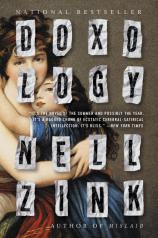Doxology
Review
Doxology
Joe Harris, Daniel Svoboda and Pamela Bailey are best friends who grow to become family. Each is the product of his or her particular upbringing, but also of a 1970s childhood and 1980s adolescence. From the Cold War to punk rock, they come of age in the booms and busts of the second half of the 20th century. Pam is jaded and pragmatic, Joe is optimistic and cheerful, and Daniel is even-tempered and thoughtful. It is music that brings them together, but the birth of Daniel and Pam’s daughter, Flora, solidifies their friendship.
These three individuals, along with Flora, are the compass points of Nell Zink’s latest novel, DOXOLOGY. It is a sweeping view of the last three American decades, with a focus on cultural changes from pop culture to politics and the transformation of family and personal identity in the new millennium.
"It is entertaining and timely, full of winking references to music, art, politics and contemporary culture. Zink’s writing style is quirky..."
Though Joe, Daniel and Pam all love music, it means something different to each of them. For Pam, music is a rebellion against her strict upbringing and cold parents. For Daniel, it is an enterprise with which to explore and experiment. But for Joe, music is his primary mode of expression. He is constantly writing songs, and his compositions are both unique and of their time. With the support and assistance of Pam and Daniel, now a couple, Joe lands a record deal. It comes as a surprise to all of them that he becomes a star, even a sex symbol.
As Joe gets increasingly famous, Pam and Daniel find themselves growing more domestic, settling down into regular jobs and raising Flora. Despite his fame, Joe continues to act as Flora’s babysitter, instilling in her a fanciful and hopeful view of the world that balances out the realism she learns from her parents. But that worldview draws danger to Joe, mostly in the form of a junkie girlfriend named Gwen. On September 11th, as New York City and the rest of the country struggle with the unthinkable, Gwen leaves Joe for dead following an overdose.
As important to them as Joe was, Pam and Daniel, and eventually Flora, seem to take his death in stride. They also easily adjust to a new familial arrangement wherein Flora goes to live with Pam’s parents, while Pam and Daniel stay in New York. This is indicative of DOXOLOGY overall; it is full of interesting developments and big challenges, but the characters just roll along. The second half of the novel deals mostly with Flora’s career with the Green Party on the eve of Trump’s election. There it becomes a story about politics and decidedly more cynical. At the same time, Flora is coming into her adulthood and making choices about love, partnership and her future.
Zink packs a lot into this book, and some streamlining may have been in order. She has a story to tell here, but perhaps not a point to make, and she doesn’t give readers much opportunity to really empathize with the characters. Pam, Daniel, Joe and Flora are given stuff to do, but they often fail to respond in authentic ways, so the novel sometimes feels flat. Zink could’ve given them all much more emotional power, and the story would’ve been stronger for it.
All this is not to say that DOXOLOGY isn’t worth reading. It is entertaining and timely, full of winking references to music, art, politics and contemporary culture. Zink’s writing style is quirky --- descriptive and funny, but holding characters, and thus readers, at a distance.
Reviewed by Sarah Rachel Egelman on September 6, 2019
Doxology
- Publication Date: May 19, 2020
- Genres: Fiction
- Paperback: 416 pages
- Publisher: Ecco
- ISBN-10: 0062877801
- ISBN-13: 9780062877802




